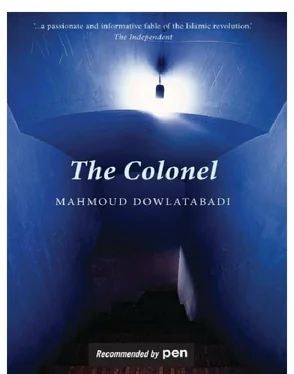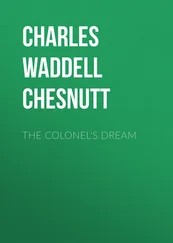They did not take long. One of them took a torch from a deep pocket in his parka and, even though he could see the colonel’s face perfectly well by the cold light from the shrine, he pointed the sharp beam at him, flashed it round the rain-soaked yard and, before it could reflect off the water in the pond, shone it down on the colonel’s wet galoshes and then switched it off, as if waiting for his companion to make a move.
The colonel was full of questions. As he stood there in the rain, hunched and stooping, with his rigid, frightened gaze, he looked just like a question mark written by a child with bad handwriting. But no question came to his lips: not a single word could he utter. He could not even remember the simplest of greetings. He just stared at the two young men, still standing outside, who seemed to be inspecting something somewhere in the rainy reflections from the shrine.
They could think whatever they wanted, but what was preoccupying the colonel, quite apart from the fear flowing through him like a river, was that these two were the same age as Mohammad-Taqi and Kuchik. All he could think was that if Mohammad-Taqi had lived, he would have been twenty-one in March, on 3rd March 1983 to be exact, and that Kuchik Masoud, if he were still alive, would now be about twenty-six.
What could I have done? What should I have done? There was nothing, nothing that I could have done. Things were out of my control by then. The children had grown up. They knew their own minds and felt no need to listen to anything I had to say to them. Come on, could I have ordered them not to be so hot-headed? There was a revolution on then, a revolution, you know, and it was every man for himself. Except the young, you can’t say the young were driven entirely by self-interest. The young were all trying to find themselves in the revolution, trying to give some meaning to their lives. Revolution gave them a thrill and kept their adrenaline going. They were riding a wave of excitement, like a dove that flies higher and higher to reach the sun, until it burns up — that’s the acme of truth for youth! The revolution carried my children off and I have no idea at what point any of them got burned, or may still be burning, for that matter. We should feel sorry for our immediate neighbours, our fellow townsmen and fellow countrymen, if any of their young men should come back from the edge of immolation only half-burned, if they descend from that height only to discover that the truth they have found is nothing but specious doctrine and bogus ideology… Then this glowing, molten wreck turns into a stream of raging fire…
“Now then, lads, don’t stand outside in the rain, come inside.”
What else could he have said? Even though they had not shown the colonel their identity cards, he could hardly object to their coming in.
The fact is, I’m frightened, I’ve been very frightened for a long time now…
Perhaps he should have left the yard gate unlocked. The very thing that could happen if he left it unlocked had just happened. Locking the gate had become second nature to the colonel. It was not so much a conscious act of securing his property now, but just a habit born of fear.
I am afraid, my friend, I am afraid. I don’t know of what or of whom, but I feel that people are something more than just the clothes they wear. I feel that man comes naked into the world, and most of the time I can’t help seeing myself as naked, too. All the good manners and politeness in the world actually tell you nothing about people. When I see through people, I’m shocked at what confronts me, because they remind me of herds of wild, stampeding buffalo — I probably saw them in a film. I screw my eyes tight shut to keep the image out, or rather they shut by themselves, out of sheer fright, as I see herds of men with strange horns growing out of their heads coming to destroy everything, including me, this little heap of bones. A nightmare, my friend.
“My good fellow, why don’t you come in and sit down? Oh, yes, I should warn you, those bentwood chairs are clapped out and they crack like a dry poppadom when you sit on them, but as they used to say: what we have is what we have, and a guest is a guest. Anyway, please have a seat!”
They will sit down, won’t they…? Yes, a seat for the gentlemen… A towel, maybe…
He could have fetched a towel to dry his rain-soaked white hair and wipe his face and neck, but it was too late. He had thought of it too late. It was all he could do to light a cigarette and sit down on one of the opium-coloured chairs, with his back to the stove. A kind of calm was creeping over him, even though he was having to hold his left hand to stop it shaking. Even worse was the way his cigarette would not stop twitching; there it was in his hand, it seemed to have acquired a life of its own… This is a small town. It hasn’t grown like all the others; everyone knows everyone else here. If I could just control my nerves and gather my wits for a minute, I am sure I’ll know who my visitors are, or at least know their parents. Although I wasn’t born here, I have lived here so long that my Parvaneh was born in this town. Amir, the eldest, was no more than fifteen when we moved here, and the middle boys were so small that in no time they spoke like the locals. If my mind doesn’t fail me, I’m sure I’ll be able to get my visitors to admit they know Mohammad-Taqi and Masoud. Maybe they were friends, even. I bet they were at school together, sharing a desk. Or if not, they must at least have run across one another during all the ballyhoo in the revolution …
His guests were silent and kept their faces averted, as if they were embarrassed to be there. Finally, the one who reminded the colonel of Mohammad-Taqi — or did the colonel only wish he did? — could stand it no longer. He got up and went over to the big portrait of The Colonel and stood staring at Mohammad-Taqi’s photo for a long while, with the hood of his parka hanging down over his back. Meanwhile the other lad, whom the colonel thought was the very spit of Masoud, just sat opposite him, with his arms crossed and his elbows on the table, gazing in silence at a threadbare corner of the old red table cloth.
One would think that boys were born coy, but there lurks within them a dreadful, perverse force that can, in the blink of an eye, turn them into savage beasts, beasts that since the beginning of history have been easily drawn into committing the most appalling of crimes, just to prove themselves. They follow their orders to the letter and call what they do acts of heroism. Can we blame them? What about us, the people who send these unformed lumps of soft putty out onto the street, where they fall into the arms of the first merchants of villainy they come across? And we just sit back and wait for them to be turned into rods to beat our own backs…
“My Mohammad-Taqi was in his first year of medicine…”
“I knew him, yes, I knew him…”
Maybe the conversation had gone like that, or maybe it hadn’t but, from the way the young man was standing, the colonel assumed that he had known his son. He wanted to believe that he had met Mohammad-Taqi, even though he doubted that knowing or not knowing someone like him would make any difference to his situation, whatever it was. But, just for a moment, the thought took the colonel’s mind off the maelstrom of his thoughts.
He’s just as impatient as Mohammad-Taqi was.
Which was probably why he did not linger in front of the photograph, and the colonel did not think he would spend much time looking at Parvaneh’s photo either. Instead, the youth sat down, checked his watch and glanced at his colleague. It seemed to the colonel that the young man must be worried about the time, for time had passed and nothing had been explained. As for the colonel himself, he was unnerved by their uncertainty and gaucheness. He still did not know where the blow was going to fall. He just had to wait for it. The only thing he was sure of was that these young men — they looked wrecked and melted by their return to earth from the sun — had not come knocking at his door to pour balm on his wounds. All he could do was wait. And so he waited, until one of them spoke:
Читать дальше












